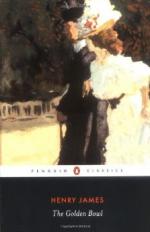pretended, nobleness, cleverness, tenderness.
It was the first sharp falsity she had known in her
life, to touch at all, or be touched by; it had met
her like some bad-faced stranger surprised in one of
the thick-carpeted corridors of a house of quiet on
a Sunday afternoon; and yet, yes, amazingly, she had
been able to look at terror and disgust only to know
that she must put away from her the bitter-sweet of
their freshness. The sight, from the window,
of the group so constituted,
told her why, told
her how, named to her, as with hard lips, named straight
at her, so that she must take it full in the
face, that other possible relation to the whole fact
which alone would bear upon her irresistibly.
It was extraordinary: they positively brought
home to her that to feel about them in any of the
immediate, inevitable, assuaging ways, the ways usually
open to innocence outraged and generosity betrayed,
would have been to give them up, and that giving them
up was, marvellously, not to be thought of. She
had never, from the first hour of her state of acquired
conviction, given them up so little as now; though
she was, no doubt, as the consequence of a step taken
a few minutes later, to invoke the conception of doing
that, if might be, even less. She had resumed
her walk— stopping here and there, while
she rested on the cool smooth stone balustrade, to
draw it out; in the course of which, after a little,
she passed again the lights of the empty drawing-room
and paused again for what she saw and felt there.
It was not at once, however, that this became quite
concrete; that was the effect of her presently making
out that Charlotte was in the room, launched and erect
there, in the middle, and looking about her; that
she had evidently just come round to it, from her
card-table, by one of the passages—with
the expectation, to all appearance, of joining her
stepdaughter. She had pulled up at seeing the
great room empty—Maggie not having passed
out, on leaving the group, in a manner to be observed.
So definite a quest of her, with the bridge-party
interrupted or altered for it, was an impression that
fairly assailed the Princess, and to which something
of attitude and aspect, of the air of arrested pursuit
and purpose, in Charlotte, together with the suggestion
of her next vague movements, quickly added its meaning.
This meaning was that she had decided, that she had
been infinitely conscious of Maggie’s presence
before, that she knew that she would at last find
her alone, and that she wanted her, for some reason,
enough to have presumably called on Bob Assingham
for aid. He had taken her chair and let her go,
and the arrangement was for Maggie a signal proof
of her earnestness; of the energy, in fact, that,
though superficially commonplace in a situation in
which people weren’t supposed to be watching
each other, was what affected our young woman, on
the spot, as a breaking of bars. The splendid
shining supple creature was out of the cage, was at




